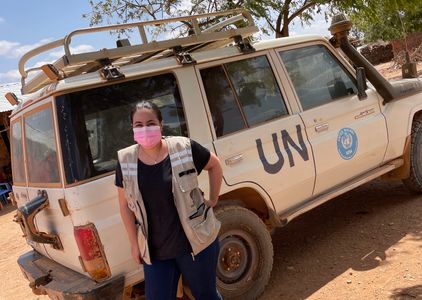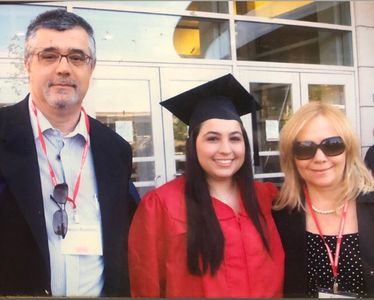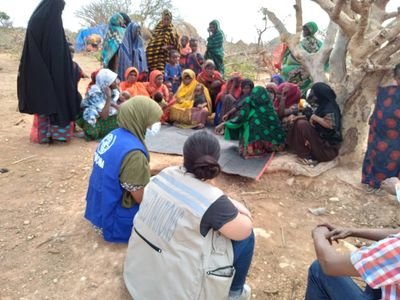Alum Helps Bring Humanitarian Aid in Ethiopia
All photos courtesy of Bruna Bambini

In October 2020, Bruna Bambini arrived in Addis Ababa, excited to start her new job as a United Nations humanitarian affairs officer. She would be working for the Office for the Coordination of Humanitarian Affairs (OCHA), the arm of the UN that organizes responses to emergencies and international disasters. In Ethiopia, she’d help mobilize resources following crises like floods and droughts, and the food insecurity and water shortages that come with those natural disasters.
“I felt very alone at the beginning,” says Bambini (’08, Pardee’10), who had moved to the capital from Rome. “But, for the most part, it was considered a pretty stable operation.”
Two weeks later, civil war broke out between government forces and rebel fighters in northern Ethiopia. More than a year later, the fighting continues. The conflict has killed thousands of people and displaced millions. It has also exacerbated the country’s existing crises and amplified the need for humanitarian aid, with more than 9 million people in need of food just in the north alone.
As the conflict plays out, Bambini emphasizes that she is focused on providing aid to whoever needs it. As an OCHA officer, “I uphold the four humanitarian principles of humanity, neutrality, impartiality, and independence,” she says.
Bambini’s role was supposed to be administrative—sitting in an office, communicating with donors, and helping allocate emergency funds for humanitarian needs around food, water, and sanitation. But, when the war broke out, she was pulled into high-level meetings, helping OCHA’s Ethiopia office however she could. “If you work for OCHA during a war or a natural disaster, then it’s all hands on deck,” she says. “Nobody cares what exactly you were hired to do—everyone is just doing whatever needs to be done.”
International Aspirations
Bambini, who grew up in Sao Paulo, Brazil, had dreamed of seeing the world since she was young.
“I knew that my life was supposed to be bigger than my comfort zone in Brazil,” she says. “I always had this urge to explore and meet people from different places.”

That dream led her to study at BU, and her time at CGS convinced her to major in international relations. “The CGS model was perfect for me. It gave me the time to learn a little bit more, explore electives, and figure out what I liked and what I didn’t like.” She took an introductory international relations class and fell in love with the subject: “I was like, ‘This is exactly what I want to do with my life.’” By the time graduation came around, she was set on working for the UN. “I just wanted to make a difference. I didn’t know how I was going to work for the UN, but I was determined to figure it out.”
The path wasn’t easy.
After graduation, she had to return to Brazil because of visa issues. “I had absolutely no professional network in Brazil. The kind of jobs I wanted just weren’t available there,” Bambini says. She moved to Italy to earn a master’s degree, focusing on European and international policies and crisis management, but had to go back home again for visa reasons. She was working and applying for internships with the UN when her master’s thesis advisor secured her an interview with the UN Food and Agriculture Organization (FAO), which works to combat global hunger. She was offered an internship at the FAO headquarters and moved to Italy for the job. It wasn’t long before she was hired full time, supporting UN FAO offices around the world with their emergency preparedness programming and consulting for the organization’s internal ethics office.
“One thing I’d tell anyone aspiring to work for the UN is to be resilient,” Bambini says. “There’s no set path for working for [the organization]. You need to be sure of what you want and stick to it, because it took me years to get an internship. I quit a job to be an intern because I believed in what I wanted for my career and for my life. It’s important to be resilient because it’s not easy to get there.”
Bambini says it’s been worth it. She is seeing the world just as she had wished growing up.
In 2019, the FAO sent her to Mozambique for four months to help with its emergency response after a series of cyclones caused severe flooding and displaced thousands of people. It gave her a taste of what it was like to work in the field.
“It was eye-opening because it was the first time that I was seeing up close the work that we do and the impact that we can have,” she says. “I was talking to people in the community there because I speak Portuguese, and I learned a lot. That experience gave me the certainty that I really needed to go live in one of these countries and be closer to the kind of humanitarian aid work that I wanted to do.”
Critical Thinking

Bambini is to remain in Ethiopia at least through October 2022, when her contract is up. She admits that the first few months on the job were stressful. “Between the conflict, COVID, and being in a new country and not knowing anyone, I had this moment where I was like, ‘What did I do?’” she says. “But then, slowly, I started meeting people, and I’ve learned to get used to the uncertainty.” It’s still an all-hands-on-deck situation.
OCHA is not the unit responsible for on-the-ground operations, so she is not delivering food or clean water to areas that need it, for example. Rather, she helps coordinate the system for doing so—requesting the funding and organizing the aid responses. Since beginning her job there, she’s helped direct a record number of applications for aid. “Ethiopia is a very complex operation. It’s not just the war in the north. You have all the issues that already existed—the needs are incredible,” she says.
Her ability to think inventively as she helps navigate the volatility in the country is a skill she says she honed at BU: “Something I value most from the education that I got at CGS is this ability to both think critically and make connections across different areas.”
Currently, Ethiopia and the surrounding countries are experiencing drought for a third consecutive rainy season. In addition, the conflict has displaced people who rely on agriculture for their livelihoods and food sources. “They are unable to produce food, they need to find shelter, and then there are needs in terms of water and sanitation,” Bambini says. “And people are sheltering in some very inadequate places, so you start having disease outbreaks. On top of that we also have COVID.”
In the face of all of these compounding crises, Bambini says persistence is key.
“We’re trying to do everything we can to help,” she says. “It can be both incredibly frustrating and incredibly rewarding work, but I feel lucky to do it.”
